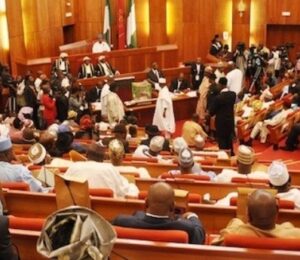Lawmakers Call for Rethink on Border Closure as Smuggling and Insecurity Persist; Give Reasons
Lawmakers Call for Rethink on Border Closure as Smuggling and Insecurity Persist; Give Reasons

Members of the National Assembly have strongly criticized Nigeria’s ongoing border closure policy, describing it as ineffective and counterproductive in tackling the nation’s rising issues of smuggling and cross-border insecurity. The lawmakers, speaking during a budget defense session with Jumoke Oduwole, the Minister of Industry, Trade, and Investment, emphasized that the country’s borders remain vulnerable to illegal activities.
Francis Fadaunsi, a member of the Committee on Industry, argued that the persistent closure of the borders has not achieved the intended results. He suggested that reopening the borders would be a more practical solution. Fadaunsi pointed out that the recent exit of Niger and Chad from the Economic Community of West African States (ECOWAS) and the subsequent reopening of their borders to Nigerians has only exacerbated insecurity and worsened Nigeria’s economic challenges.
The lawmaker further highlighted the negative impact of the border closure on the country’s economy, noting that rather than curbing smuggling, it has fueled it. He gave the example of Nigeria’s rice production, where a significant portion of the 4 million-tonne shortfall is smuggled into the country, while local producers only meet 3 million tonnes of the expected 7 million-tonne consumption rate.
Fatima Talba, a representative from Yobe State, echoed Fadaunsi’s concerns, pointing out that, from the perspective of her constituents, the borders are effectively not closed. She stressed the need to stop deceiving ourselves, given the free flow of people, including criminals, across the borders.
Paul Kalejaiye, a lawmaker from Lagos State, also raised questions about the specific implementation of the border closure policy. He asked whether all borders in the country were closed or if only certain segments of the country were being affected by the closure.
Suleiman Umar, Chairman of the Senate Committee on Industry, Trade, and Investment, called on Minister Oduwole to work with the presidency to find a way out of the current border closure situation.
Earlier, Oduwole had presented the ministry’s budget plans, revealing that N3.8 billion is allocated for capital expenditure, N4.65 billion for personnel costs, N1.45 billion for overheads, and a projected revenue of N2.4 billion for the 2025 fiscal year.
TRENDING SONGS
 NPMA Appeals to Nigerian Government for Compensation After Lagos Market Fire
NPMA Appeals to Nigerian Government for Compensation After Lagos Market Fire
 Rest Every Four Hours, FRSC Issues Safety Guide for Fasting Motorists
Rest Every Four Hours, FRSC Issues Safety Guide for Fasting Motorists
 NNPC Boss Ojulari Bags UK Energy Institute Fellowship
NNPC Boss Ojulari Bags UK Energy Institute Fellowship
 Shock in Anambra: Bride Disappears Moments Before Wedding
Shock in Anambra: Bride Disappears Moments Before Wedding
 Nigerian Woman Returns ₦330 Million Accidentally Credited to Her Account
Nigerian Woman Returns ₦330 Million Accidentally Credited to Her Account
 APC Don Reach Morocco?’ VeryDarkMan Reacts to Seyi Tinubu Poster
APC Don Reach Morocco?’ VeryDarkMan Reacts to Seyi Tinubu Poster
 Bride Breaks Down in Tears as Wedding Meals Were Kept Secretly While Guests Go Home Hungry
Bride Breaks Down in Tears as Wedding Meals Were Kept Secretly While Guests Go Home Hungry
 Odogwu by Day, Robber by Night: How Marriage Joy Turned Into Tragedy
Odogwu by Day, Robber by Night: How Marriage Joy Turned Into Tragedy
 Nigerian Officials Allegedly Pocket N4–6B Weekly Through Smuggling Cartels at Seme–Badagry Border
Nigerian Officials Allegedly Pocket N4–6B Weekly Through Smuggling Cartels at Seme–Badagry Border
 Ahmad Yerima: Naval Officer to Face No Sanctions After Clash with Wike – Matawalle
Ahmad Yerima: Naval Officer to Face No Sanctions After Clash with Wike – Matawalle
Share this post with your friends on ![]()













